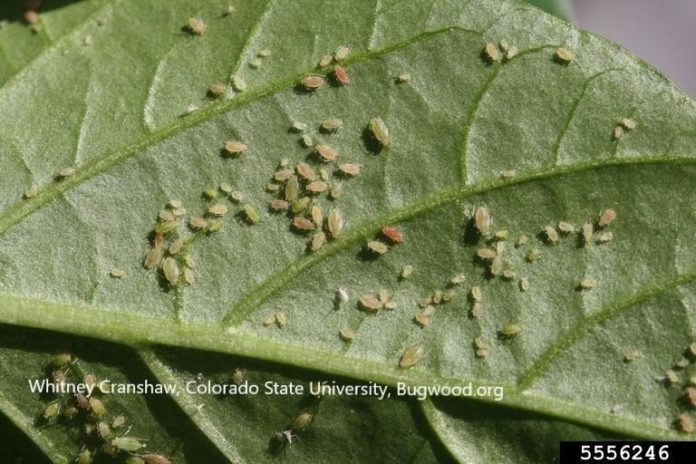By Cheryl Huckabee
An aphid infestation can wreak havoc on a vegetable garden.
John A. Jackman of Texas A&M AgriLife Extension offers a few tips you might consider this year.
A reflective mulch such as foil paper on top of the soil below your plants can slow aphid infestation.
In early spring or early fall, put a fine mesh screen or fabric over your garden. Your plants will need to be monitored regularly, preferably daily, so you will need to remove the barrier. It’s not recommended to leave barriers in place during the hot summer months; the temperature inside the barrier is warmer than outside so it can cause your plants to suffer from heat stress.
High-pressure water sprays can dislodge aphids. You will need to repeat this treatment frequently.
Use pesticides, Neem oil, and insecticidal soaps only as a last resort. These products will also kill beneficial insects that naturally control aphids.
There are cultural practices to consider, such as removal of any plant debris and disposal of weeds or other unwanted plants that pop-up to get rid of aphid food and shelter before planting and throughout the growing season. When the growing season ends, remove plant debris, etc., again so aphids will not overwinter there.
Control of aphids is easiest soon after they hatch from the eggs. Look for egg clusters or tight groups of eggs on the undersides of the leaves. You can gently scrape away the eggs or remove them with a blast of water.
Healthy vegetables can withstand some aphid damage but stressed plants are much more susceptible to insect damage. Practicing good irrigation, mulch, and fertilization habits go a long way toward growing healthy vegetables that can tolerate some insect damage and still produce for you.
A list of registered pesticides for use on home garden vegetables and common insect pests can be found at AgriLife: https://agrilifeextension.tamu.edu/library/gardening/managing-insect-and-mite-pests-in-vegetable-gardens/
On the AgriLife website, an excellent resource is Managing Insect and Mite Pests in Vegetable Gardens: agrilifeextension.tamu.edu/library/gardening/managing-insect-and-mite-pests-in-vegetable-gardens/.
For more information about gardening in North Texas visit dcmga.com/north-texas-gardening.
Happy Gardening!
Cheryl Huckabee is Communications Director at Denton County Master Gardener Association, Texas A&M AgriLife Extension – Denton County.



















